第60章 THE FALL OF THE LEAF.(1)
November 6th.--The weather is as peaceful to-day, as calm, and as mild, as in early April; and, perhaps, an autumn afternoon and a spring morning do resemble each other more in feeling, and even in appearance, than any two periods of the year. There is in both the same freshness and dewiness of the herbage; the same balmy softness in the air; and the same pure and lovely blue sky, with white fleecy clouds floating across it. The chief difference lies in the absence of flowers, and the presence of leaves. But then the foliage of November is so rich, and glowing, and varied, that it may well supply the place of the gay blossoms of the spring; whilst all the flowers of the field or the garden could never make amends for the want of leaves,--that beautiful and graceful attire in which nature has clothed the rugged forms of trees--the verdant drapery to which the landscape owes its loveliness, and the forests their glory.
If choice must be between two seasons, each so full of charm, it is at least no bad philosophy to prefer the present good, even whilst looking gratefully back, and hopefully forward, to the past and the future. And of a surety, no fairer specimen of a November day could well be found than this,--a day made to wander 'By yellow commons and birch-shaded hollows, And hedgerows bordering unfrequented lanes;' nor could a prettier country be found for our walk than this shady and yet sunny Berkshire, where the scenery, without rising into grandeur or breaking into wildness, is so peaceful, so cheerful, so varied, and so thoroughly English.
We must bend our steps towards the water side, for I have a message to leave at Farmer Riley's: and sooth to say, it is no unpleasant necessity; for the road thither is smooth and dry, retired, as one likes a country walk to be, but not too lonely, which women never like; leading past the Loddon--the bright, brimming, transparent Loddon--a fitting mirror for this bright blue sky, and terminating at one of the prettiest and most comfortable farmhouses in the neighbourhood.
How beautiful the lane is to-day, decorated with a thousand colours!
The brown road, and the rich verdure that borders it, strewed with the pale yellow leaves of the elm, just beginning to fall; hedgerows glowing with long wreaths of the bramble in every variety of purplish red; and overhead the unchanged green of the fir, contrasting with the spotted sycamore, the tawny beech, and the dry sere leaves of the oak, which rustle as the light wind passes through them; a few common hardy yellow flowers (for yellow is the common colour of flowers, whether wild or cultivated, as blue is the rare one), flowers of many sorts, but almost of one tint, still blowing in spite of the season, and ruddy berries glowing through all. How very beautiful is the lane!
And how pleasant is this hill where the road widens, with the group of cattle by the wayside, and George Hearn, the little post-boy, trundling his hoop at full speed, making all the better haste in his work, because he cheats himself into thinking it play! And how beautiful, again, is this patch of common at the hilltop with the clear pool, where Martha Pither's children,--elves of three, and four, and five years old,--without any distinction of sex in their sunburnt faces and tattered drapery, are dipping up water in their little homely cups shining with cleanliness, and a small brown pitcher with the lip broken, to fill that great kettle, which, when it is filled, their united strength will never be able to lift!
They are quite a group for a painter, with their rosy cheeks, and chubby hands, and round merry faces; and the low cottage in the background, peeping out of its vine leaves and china roses, with Martha at the door, tidy, and comely, and smiling, preparing the potatoes for the pot, and watching the progress of dipping and filling that useful utensil, completes the picture.
But we must go on. No time for more sketches in these short days.